




 |
   |
 |
David Bowie (UK) see: |
 |
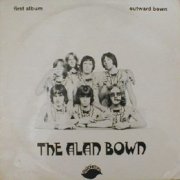 |
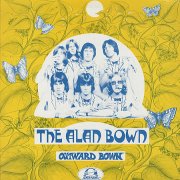 |
Outward Bown (1967, 38.30) ***/T½ |
|
| Toyland Magic Handkerchief Mutiny All Along the Watchtower Sally Green Penny for Your Thoughts Story Book Technicolour Dream |
Love is a Beautiful Thing Violin Shop You're Not in My Class My Girl the Month of May |
||
Current availability:
Mellotron used:
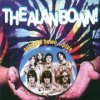 |
The Alan Bown! (originally The Alan Bown Set) were a pretty typical British mid-'60s soul/blues outfit who shifted into psych (see: Zoot Money, Simon Dupree & the Big Sound) as it caught on. Aside from bandleader/trumpeter Bown (later, improbably, a member of second-division proggers Jonesy), this lineup of the band is best known for unleashing undersung vocalist Jess Roden's talents on the world, plus future Supertramp saxophonist John Helliwell, although both Mel Collins (King Crimson, a million others) and Robert Palmer subsequently passed through their ranks. After a run of singles, they debuted on long-player with 1967's Outward Bown, a strange mixture of newly-fashionable whimsical psych (Toyland, Magic Handkerchief, Story Book), soul flashbacks (Sally Green, Love Is A Beautiful Thing, complete with a painfully out of tune slide guitar/sax duet) and a smattering of 'uncategorisables', including their jazzy version of Dylan's All Along The Watchtower (which presages Hendrix' by a full year), the proto-hard rock of Penny For Your Thoughts and the jaunty pirate romp Mutiny.
Keys man Jeff Bannister adds Mellotron to several tracks, with what sound like MkII accordion on Mutiny, near-inaudible flutes on Story Book and strings on Sally Green, Violin Shop and (in the background) My Girl The Month Of May. All in all, then, a reasonably decent semi-psych effort, although I get the impression that Bown's best work is probably best compiled from his various releases. Just to confuse matters, the album was released in the States as The Alan Bown!, with a slightly different tracklisting; the version to get is the See for Miles CD, which collects together all fourteen tracks, plus two mono versions.
See: Jonesy
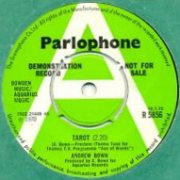 |
7" (1970) ***½/TTT½ Tarot Lulli Rides Again |
Current availability:
Mellotron used:
Andrew/Andy Bown's first recording came out as early as 1964; after spells in The Herd and Judas Jump, he released Tarot under his own name in 1970. The theme tune to UK children's TV show Ace of Wands (inspiration for Steve Hackett, I believe), it's a short, snappy, upbeat sort of song, the flip, Lulli Rides Again (thanks, Lewis), being a strident instrumental. Good MkII Mellotron presence (brass and strings) on both tracks. I don't believe it's currently available anywhere, although I'd be more than happy to be proved wrong.
Bown went on to release a clutch of solo albums while playing sessions, ending up becoming Status Quo's permanent keyboard player. Now largely regarded as a joke, Quo were actually a ferocious live act as late as their 'split' in 1984, but I wouldn't bother with the current outfit if I were you. Anyway, if you get a chance to obtain Tarot on whatever format, it's worth the effort.
See: Judas Jump
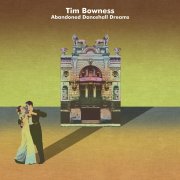 |
Abandoned Dancehall Dreams (2014, 44.10/78.47) ****/TTT (TTT½) |
|
| The Warm-Up Man Forever Smiler at 50 Songs of Distant Summers Waterfoot Dancing for You Smiler at 52 I Fought Against the South Beaten By Love |
[Bonus disc: There Were Days (Smiler at 52, Grasscut mix) Sounds of Distant Summers (Songs of Distant Summers, Richard Barbieri mix) Singing for You (Dancing for You, UXB mix) Abandoned Dancehall Dream The Sweetest Bitter Pill The Warm-Up Man Forever (band version) Songs of Distant Summers Part 1 (band version) Songs of Distant Summers Part 2 (band version)] |
|
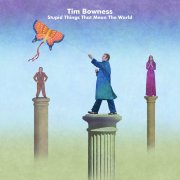 |
Stupid Things That Mean the World (2015, 42.14) ***½/T½ |
|
| The Great Electric Teenage Dream Sing to Me Where You've Always Been Stupid Things That Mean the World Know That You Were Loved Press Reset All These Escapes Everything You're Not |
Everything But You Soft William At the End of the Holiday |
|
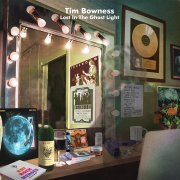 |
Lost in the Ghost Light (2017, 43.31) ****/TTT½Worlds of YesterdayMoonshot Manchild Kill the Pain That's Killing You Nowhere Good to Go You'll Be the Silence Lost in the Ghost Light You Wanted to Be Seen Distant Summers |
Current availability:
Mellotrons used:
It's taken No-Man doyen Tim Bowness ten years to follow his solo debut, 2004's My Hotel Year (reviewed here), with Abandoned Dancehall Dreams. Would it surprise you to hear that it was worth the wait? Probably not, if you've investigated his catalogue to a greater depth than have I. His signature sound is present and correct: melancholic, yet entirely unlike, say, Morrissey's tiresome miserablism. The album kicks off with the unusually rhythmic The Warm-Up Man Forever, before settling into Bowness' distinctive, laid-back style. Highlights? Well, it's all good, but this listener particularly liked Smiler At 50 (musically and lyrically), the instantly-recognisable Yamaha CP70 piano on Dancing For You (also turning up on Smiler At 50) and I Fought Against The South.
Frequent Bowness collaborator Stephen Bennett's Novatron (late '70s, post-disastrous US court case Mellotron) appears on most tracks, with background choirs on opener The Warm-Up Man Forever, full-on ones on Smiler At 50, background choirs and upfront strings on Songs Of Distant Summers, a solo flute on Waterfoot, upfront strings on Dancing For You and strings, beautiful chordal flutes and choirs on I Fought Against The South, while the string section on Smiler At 52 makes me wonder if some of the 'Mellotron' isn't. The two-disc edition gives us remixes, outtakes and band versions, with several extra Mellotron tracks. We get a string line on Abandoned Dancehall Dream itself, chordal choirs on The Sweetest Bitter Pill, chordal flutes and string swells on The Warm-Up Man Forever (Band Version) and choir and string swells on Songs Of Distant Summers Part 1 (Band Version), should you go for this version of the album.
I hopes familiarity isn't breeding contempt, but, somehow, 2015's Stupid Things That Mean the World doesn't have quite the same impact as its predecessor, although it's still a fine record. As with its predecessor, it opens with one of its most intense tracks, in this case, The Great Electric Teenage Dream, other highlights including Sing To Me, the largely acoustic Know That You Were Loved and semi-epic closer At The End Of The Holiday. Far less Novatron this time round, with distant choirs on The Great Electric Teenage Dream, chordal strings on Sing To Me, pitchbent choirs on Press Reset and a string line on At The End Of The Holiday, although those are real strings on the title track.
2017's Lost in the Ghost Light is a concept album, the (semi-autobiographical?) tale of Jeff Harrison, a jaded rock singer looking back over his career. The sleeve displays a wealth of detail, largely invisible on the tiny reproduction above: the gold disc, the setlist, the signed LP, the jar of 'age defying moisturiser', the book, Art Rock Heroes, by a variant on artist Jarrod 'I Monster' Gosling. Interestingly, though, no overflowing ashtray, once de rigueur in similar pictures; a sign of the times, eh? Bowness seems to've regained his mojo, assuming you could consider it lost on Stupid Things..., highlights including opener Worlds Of Yesterday, Moonshot Manchild, You'll Be The Silence and Distant Summers, reiterating Abandoned...'s Songs Of Distant Summers, from three years earlier. Actually, several of these songs on this self-consciously 'progressive' album are (quite deliberately) reminiscent of the sound Genesis made their own in the late '70s-to-early '80s, with a chordal sophistication that owes a little to several genres and quite a lot to the inside of Tony Banks' head, aided by that Banksian CP70 piano. Back to a greater Novatronic presence this time round, with strings all over Worlds Of Yesterday and Moonshot Manchild, plus choirs on the latter, background choirs on Nowhere Good To Go and You'll Be The Silence, plus full-on strings on the latter, strings under the violin on You Wanted To Be Seen and strings on Distant Summers.
I've no idea what Bowness' next move may be - a return to No-Man? - but, given the sheer quality of these albums, I don't think it would be unfair to hope that he carries on producing such strong work for a little while yet. [n.b.] Bowness' next move was to not put any Mellotron onto 2019's Flowers at the Scene.
See: Samples etc. | No-Man | Henry Fool | Opium Cartel
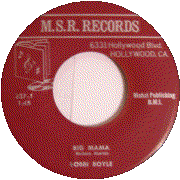 |
7" (196?) *½/T½ Big Mama Sleepy Head |
Current availability:
Chamberlin used:
Bobbi Boyle and Dick Kent are likely to be pseudonyms, oft-used in the murky waters of the '60s and '70s song-poem industry (see: Rodd Keith): lyrics sent in to companies by hopeless hopefuls, set to music by jaded 'composers' and session hacks, all for a fee, of course. This particular obscure 7" (thanks once again to Mark Medley) pairs two 'artists', 'Boyle' (or maybe it's her real name?) singing Barbara Newton's Big Mama, while 'Kent' tackles Stuart Colley's Sleepy Head, two lyrics of stunning mundanity set to music of unutterable mediocrity, as you might expect. Big Mama is mercifully short, coming in at under two minutes, while Sleepy Head's just over two minutes seems to last forever and not in a good way.
The usual anonymous session guy plays Chamberlin strings on both sides of the disc, more overtly on the flip than the 'A', which isn't to say that any of it's any good. Let's face it; even if, for some perverted reason, you actually wanted to hear this, you're not exactly going to pick it up at your local second-hand record emporium, assuming such things exist any more. Actually, if anyone really wants to hear these, let me know and I'll e-mail you the MP3s. You sickos.
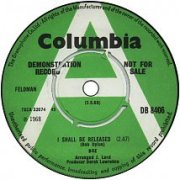 |
7" (1968) ***/TT I Shall Be Released Dove in the Flood |
Current availability:
Mellotron used:
Years before his spells in King Crimson and (extremely lucratively) Bad Company, Raymond "Boz" Burrell had a mid-to-late '60s career singing with various outfits, not least Boz People, also releasing a handful of solo singles. One of these, a cover of Dylan's I Shall Be Released (backed with another Bob number, Down In The Flood, bizarrely retitled Dove In The Flood), produced by Derek Lawrence, featured several members of the nascent Deep Purple, including Ritchie Blackmore and Jon Lord. And it's... OK. A passable reading, its only significant addition to the original being the presence of an actual singer (ouch), while the flip jams its way through the song with a workmanlike dedication to getting the job done.
Lord plays piano, so it seems likely that he also provided the A-side's Mellotron strings, possibly emanating from the MkII he used just once with Purple, with a pseudo-orchestral part, much like many similar. As you probably know, Burrell died in 2006 at the age of sixty; chalk up another victory for the rock'n'roll lifestyle.
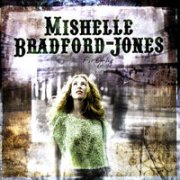 |
Firefly (2003, 50.11) **/T |
|
| Colourblind Brave Stay Anchor Baby Life is What You Make it Pins and Needles Wise Olivia Oblivion |
Backyard Darkness in the Hall Dizzy on a Razor The Queen of the Trapeze Ready or Not |
|
Current availability:
Mellotron/Chamberlin used:
Mishelle Bradford-Jones' Firefly sits at the pop end of country, by and large, at its least tiresome on Dizzy On A Razor, which is in no way to be taken as any kind of recommendation. This kind of slick, cheesy country really should be avoided at all costs. Musical slop.
This album's something of a tape-replay conundrum, to be honest: Nick Brophy is credited with Mellotron, while ex-Jellyfish/Moog Cookbook man Roger (Joseph) Manning plays Chamberlin, with occasional flutes on opener Colourblind, Brave, Pins And Needles, Olivia Oblivion and Backyard. However, despite Manning's considerable 'previous' (random selection: Johnny Cash, Beck, Wilson Phillips), only the flutes on Olivia Oblivion, really only audible at the end of the track, sound at all authentic. Is any of it real? Who knows? Well, the participants, presumably.
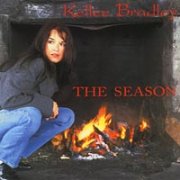 |
The Season (1999, 46.30) ***/T½ |
|
| Yes Yes The Season That's How We Are The Heartache Ends Too Deep All the People 1,000 Miles In a Big Way |
Time Can Fly Trust Me Bold Fenian Men |
|
Current availability:
Mellotron used:
Kellee Bradley's The Season is a solid Americana release, at its best on Too Deep, Time Can Fly and a capella closer Bold Fenian Men, despite its republican message. All sounds very worthy, until you look at the movement's trail of destruction. Someone should have spotted All The People's guitar line's resemblance to Manfred Mann's Pretty Flamingo, too. Surprisingly, tear-jerkers like The Heartache Ends and 1,000 Miles actually work, affecting without being mawkish. Quite a trick.
Robert Roth (Built to Spill, Truly) plays (presumably his own) Mellotron, with an upfront strings part on All The People and flutes on Trust Me, obviously real, even without knowing that Roth owns a machine. Overall, then, far better than expected.
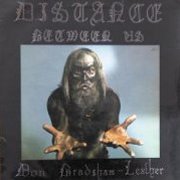 |
Distance Between Us (1972, 86.25) ***½/TTTT½Distance Between UsAutumn Mist Distance Between Us 2 Dance of the Goblins |
Current availability:
Mellotron used:
Don Bradshaw-Leather has been thought to be a pseudonym of none other than Robert John Godfrey, Barclay James Harvest's ex-orchestral arranger and future Enid leader, although other reports deny this, including Robert himself. It certainly sounds like his piano playing; concert standard and very eccentric, but, as a friend pointed out to me, Godfrey's not one to hide his light under a bushel, so it most likely actually isn't him. Distance Between Us is an ambitious double album, relying heavily on avant-garde modern classical compositional techniques, with much musical experimentation, including considerable dissonance in places.
The title track moves from an avant-classical piano part into a lengthy tribal rhythm section, with shedloads of Mellotron strings, doing a fair job of emulating real ones, while Autumn Mist relies more on harmonic dissonance on various keyboards, particularly the Mellotron. Sides three and four are just as completely barking mad, making this one of the strangest Mellotron albums it's been my, er, pleasure to hear. The only reason it doesn't get the full five-T treatment is that much of the album is impenetrably weird and many listeners simply won't be able to cope with it. Not to worry, though, as it's been out of print for thirty years, although there's supposed to be a Japanese CD version floating about, probably dubbed from crackly vinyl (again). But seriously, folks, if you stumble across a copy cheap (highly unlikely, I have to say), it's worth it for the weird Mellotron stuff, but be warned: this is not for the faint-hearted. Incidentally, although this has seen several unofficial reissues in recent years, it's yet to see a proper issue.
Billy Bragg & Wilco (UK/US) see: |
 |
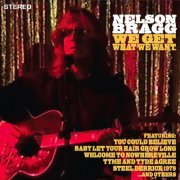 |
We Get What We Want (2012, 43.03) ****/T½ |
|
| You Could Believe What She's Done to Him Trying Hard to Please You Baby Let Your Hair Grow Long Steel Derrick 1979 Let the Cruel World Go She Used to Love Me I'm in No Mood |
Welcome to Nowhereville Tyme and Tyde Agree Everything I Want to Be |
|
Current availability:
Mellotron used:
Nelson Bragg has been playing percussion and singing professionally since the end of the '70s, notably in Brian Wilson's Smile band in the early 2000s and with California's The Quarter After. 2012's excellent We Get What We Want is his second solo album, an inspired distillation of his years playing with so many 'intelligent pop' outfits, I suspect, highlights including opener You Could Believe (especially its jaw-dropping harmony vocal intro), Steel Derrick 1979, Let The Cruel World Go and mock-Baroque (see what I did there?) closer Everything I Want To Be. Truth be told, there ain't a bad track here; how often can you say that, then?
Bragg plays what I shall affectionately moniker 'underwater strings' and landbound flutes and cellos on Baby Let Your Hair Grow Long, while his Quarter After compatriot, Rob Campanella, adds (presumably his own) upfront Mellotron strings and flutes to Steel Derrick 1979, to unsurprisingly good effect. Powerpop fans need this yesterday, while anyone with an ear for a great tune and even the tiniest sneaking regard for The Beach Boys should at least give it a listen. Well worth the effort.
See: The Quarter After
 |
Too Freud to Rock'n'Roll, Too Jung to Die (2003, 80.20) ***/T |
|
| Schizadelic K.O. My Pagan Ass Like a Motherfucker The Two Towers White Van Love, Peace & Fuck Get Back on it Messages Raising Power |
She Saw Me Coming Brain Donor Get Off Your Pretty Face Atomic Punk U-Know! Whole Lotta Loki Gimme Space Odin's Gift to His Mother |
|
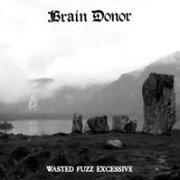 |
Wasted Fuzz Excessive (2009, 65.39) ***½/T½Gates of SkagerrakDeath Becomes You Dyslexia Rules K.O. Emerging/Shadow of My Corpse Frankenstein Fokkinger Slag/The Hanging |
Current availability:
Mellotrons used:
Brain Donor are yet another Julian Cope side-project, this time with Tony "Doggen" Foster and Kevin "Kevlar" Bales from Spiritualized, specialising in (you guessed it) faux-brain-dead, jammed-out metal madness. So far, they've released a slew of singles and three full albums, the first of which, 2001's Love, Peace & Fuck, maybe surprisingly, has no Mellotronic input. Its successor, 2003's double-disc Too Freud to Rock'n'Roll, Too Jung to Die (very good, Saint Jules, very good...), consists of one disc of studio material and one of their set at Cope's two-day event, 2000's Cornucopea. It's pretty much as you'd expect: bonkers 'is it/isn't it' ironic metal and freaked-out jamming, with a little Mellotron on the studio disc, with high strings on Schizadelic K.O., while The Two Towers features some flute and wildly pitchbent strings interjections à propos of nothing at all, and a mental strings part on Messages. Best track? Possibly disc 1's Get Down On It, for its sheer verve, or disc 2's stupendous cover of Van Halen's ripping Atomic Punk, almost certainly unfamiliar to most of his indie-schmindie audience, to my (and doubtless his) delight. Downsides? The set goes on a little too long for listening comfort, assuming one is in an unenhanced state of mind, that is.
I've no idea if there's any Mellotron on their various in-between releases, including the fantastically-named Drain'd Boner (ho ho and ho ho again), but 2009's Wasted Fuzz Excessive gets back to the Mellotron. The album seems better produced than its predecessors, although musically, it's more of the same and why not? It's Cope's outlet for expressing this particular part of his musical personality; if they suddenly went acoustic, I'd start to worry. Again, not an awful lot of the old M400, with a brief string part entering nearly ten minutes into Gates Of Skagerrak, a full-on part in Frankenstein and some flute on the first part of ultra-lengthy closer Fokkinger Slag/The Hanging.
See: Julian Cope | Black Sheep | L.A.M.F. | Queen Elizabeth
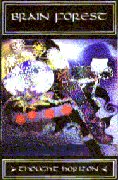 |
Thought Horizon (1995, 24.45) ****/TTT½Dark HorseLake Effect Urban Sprawl VLQ |
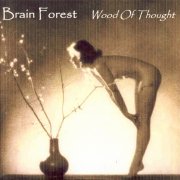 |
Wood of Thought (2002, recorded 1995, 57.56) ***/TTT½ |
|
| Daybreak La Danse des Cons Darkhorse Gene's Dilemma Urban Sprawl Brain Farce March of the Elves A Walk in the Sunlight |
Mello VLQ |
|
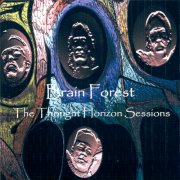 |
The Thought Horizon Sessions (2004, recorded 1995, 65.36) ***½/TT½ |
|
| La Danse des Cons Alias A Girl Like You Lake Effect Rhino Country Urban Sprawl Darkhorse VLQ |
Bandit Big Whomper Diesel Truck Shadows Maybe |
|
Current availability:
Mellotrons used:
Brain Forest were formed in 1993 by guitarist Phillip LeFrois and ex-St Elmo's Fire bassist Paul Kollar. After the usual lineup hassles, they held a four-piece together for long enough to record some material, releasing a four-song (as against 4-track) cassette, Thought Horizon, in spring 1995. It features solid, American-style prog, not a million miles away from St Elmo's Fire, but things conspired against the band and the limited form of success accorded to the likes of Echolyn or Spock's Beard was denied them.
Back to Thought Horizon. Although the original tape is still available from Brain Forest/St Elmo's Fire's label, Sprawling Productions, it remains unfairly obscure, partly, it has to be said, due to Sprawling's failure to promote the thing in any meaningful way. It might not equal The Light for sheer invention, but there's absolutely nothing here to which fans of American symphonic prog would or could object, particularly closer VLQ, a high-energy blast of guitar and Mellotron duelling, underpinned by Kollar's bass and Taurus. Speaking of the Mellotron (as always), it's on every track, used with taste, if not restraint. Kollar and LeFrois both play it, as the band lost their keyboard player before they began recording; strings across the board and a gorgeous flute part at the end of Dark Horse. For those of you without cassette decks, all four tracks are available on 2004's The Thought Horizon Sessions, which brings its own problems...
Said problems involve Sprawling's website containing conflicting information about Brain Forest's other two releases. The band's main page states that, despite putting in a good bit of work on the tapes in 2001, nothing was ever made commercially available, although the 'order information' page quite clearly lists, as well as the Thought Horizon tape, two CD-R releases, Wood of Thought and The Thought Horizon Sessions. What's a poor prog fan to believe? Since possession is commonly (though almost certainly wrongly) assumed to be 9/10ths of the law, the fact that I own these CDs makes me think that they are available and the band page is out of date.
Wood of Thought, which apparently leaked out in 2002, is actually a bit of a rag-bag of material, to be honest. It opens with a pair of instrumentals that seem to go nowhere fast; a couple of tracks (notably Gene's Dilemma) bear all the hallmarks of studio jams, dragging on far longer than their content really allows. There is some decent material here, although two of the best tracks are different versions of Darkhorse/Dark Horse and VLQ from Thought Horizon. Mellotron almost across the board again, mainly strings, plus flutes on possibly the album's best track, the folkish, harmonium-driven A Walk In The Sunlight. The 'oh what a giveaway'-titled Mello features, apart from a few cymbal swishes, nowt but flutes and strings in a pleasing configuration, with a few bursts of choir, finally, in another version of VLQ, making this rather more worth it for the Mellotron than the material.
Two years on, the Thought Horizon Sessions CD-R appeared, in a rather non-appearing kind of way. Unsurprisingly, it's an extended version of Thought Horizon, adding another eight tracks and forty minutes to the original EP. It must be noted that there's a fair bit of overlap between these various releases, with four tracks appearing in two different versions, ignoring the repetition of the entire EP on this CD-R, which is actually quite welcome, probably adding up to the fact that the band only had a handful of really good pieces. To place this in context, that's a handful more than many 'progressive' bands who have released a whole slew of horrible, derivative, pseudo-commercial albums for two decades or more. Pendragon. Moving swiftly on... This album opens with a Mellotron-free (shame!) version of Wood of Thought's second track, La Danse Des Cons, working really well as an opener. The out-of-tune harmonies on Alias betray the album's origins as a set of demos and the bulk of the rest of the 'new' material shows why the band chose not to release it first time round, to be honest. For a 'progressive' band, far too much of it falls back on a clichéd hard rock feel, to the point where LeFrois uses an Eddie Van Halen trick on Maybe (from Panama, for what it's worth). Also... Would'ja believe there are NO more Mellotron tracks than on the original tape? A couple of the unheard tracks aren't bad (La Danse Des Cons, Rhino Country), but the only real reason to get this album is to have the original EP tracks on CD and they're the only reason it gets as high a rating as it does.
So; for $20 ($26 outside the States) you can purchase Brain Forest's complete works, carefully sidestepping the 1995 cassette release, made redundant by the second CD-R, not that Sprawling's website actually tells you this. Do you want to? Well, you can compile a pretty good album from the two, taking four or five tracks from each, but neither of them really stands up on its own. In other words, you'll get one good album for $20 and the minimal cost of a blank.
See: St Elmo's Fire
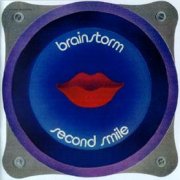 |
Second Smile (1973, 38.10) ***½/THirnwindHerbst My Way Affenzahn There Was a Time... Marilyn Monroe |
Current availability:
Mellotron used:
Brainstorm were led by future Guru Guru saxophonist Roland Schaeffer, only making two studio albums. The second, er, Second Smile, covers quite a bit of ground sonically, from the complex prog of opener Hirnwind through the acoustic whimsy of Herbst to the jazz-prog of My Way or the near-free jazz of There Was A Time... You could never accuse this lot of being boring, although the diversity can sound a little uncohesive at times. Any bad points? Yup: the vocals. As so often with this type of band, they're only used occasionally and aren't much good when they are, either stylistically or lyrically. I'm not sure what's with the spoken-word stuff, complete with Trapeze quote on closer Marilyn Monroe, either...
Mellotron on Hirnwind, probably from keys man Eddy Von Overheidt, with a great strings part, complete with multiple pitchbends, which can only trigger one question: why just the one track? Well, at least it's a good one... Overall, then, a more interesting than usual Krautrock effort, tipping into both prog and fusion, with one great Mellotron track. Worth it? Only you can decide.
 |
Wren Brandt (2007, recorded 197?, 44.59) ***/TT½ |
|
| Smilin' I Need Love Sparrow Tennessee Logroll Kingdom or a Cage Bitch In Town Sunshine |
Sweet Montana 20th Century Story Justice Jugglin' Jester With You |
|
Current availability:
Mellotron used:
According to Wren Brandt's self-written spiel on CD Baby, the master tapes of his eponymous album, finally completed and released in 2007, '...followed [him] around the country for a score and a half', making their recording date sometime around the mid-'70s, which figures. His backing band was Indianapolis outfit Shiloh Morning, whose own Mellotron album dates from '74, further authenticating his rather vague recollections. Highlights? The stomping country rock of I Need Love, In Town and the rocking Sweet Montana, perhaps.
Shiloh Morning's Mark Hancock plays Mellotron, with cellos, flutes and strings on Kingdom Or A Cage, background strings and cellos (audible at the end of the song) on In Town, orchestrally-arranged flutes and strings on Sunshine and background cellos, chordal strings and an authentic (yet still definitely Mellotronic) flute solo on closer With You. This album proves that, all these years on, there are still unreleased Mellotron-heavy recordings from the '70s lurking in people's attics, waiting for rediscovery.
See: Shiloh Morning
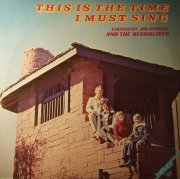 |
This is the Time I Must Sing (197?, 29.48) *½/T |
|
| This is the Time I Must Sing One Day at a Time Only One Life Oh I Need Him Get All Excited I Love Him Too Much I Keep Falling in Love Again Jesus Will Be What Makes it Heaven for Me |
Jesus Made a Believer Out of Me Jesus is Still the Answer |
|
Current availability:
Chamberlin used:
If you've read any of my other reviews of Mark Medley's splendid pre-CCM contributions to this site, you'll have some idea of what's coming. 'Evangelist' Jim Brankel & the Revivalists (my quotes) were, going by the evidence, a typical Christian outfit of the time and place, those being the mid-'70s Midwest, sounding as if the '60s never happened. The undated This is the Time I Must Sing appears to be their second album for the label (come on, Mark, where's The Sounds of His Coming? Stop laughing...), a truly appalling collection of what appears to be mostly original material, albeit lacking Brankel's compositional involvement, about the only thing for which this LP makes me thankful. Actually, I lie. There is one other thing: Brankel can sing in tune. This may seem like a given, but, believe me, in the weird, twilight world of backwoods 'gospel' (using the term in its loosest possible sense), as long as the participants were 'good Christians', pretty much everything else went out of the window.
Saying that, the uncredited female vocalist (Mrs. Brankel?) has definite pitching issues, particularly obvious on her lead vocal contributions, notably the upbeat Get All Excited, where she takes the title a little too literally and Jesus Will Be What Makes It Heaven For Me, the latter being especially painful. I'm sure most of you will've spotted the cover of Kris Kristofferson's One Day At A Time, easily the best song here (which isn't to say it's actually, y'know, a good song), as almost every original on the record piles cliché onto cliché, all filtered through a repellent easy-listening aesthetic. Tape-replay? Larry Benson of Benson Sound studios plays his own Chamberlin, with quavery strings on the opening title track and strings and vibes on Only One Life. Anyway, not only are you never going to run into this piece of shite, but, on the vague offchance that you run into a copy in a Midwest thrift store, I can only urge you to put it down and walk away. Just step away from the Xian horror...
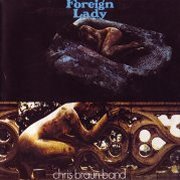 |
Foreign Lady (1973, 34.55) ***/TNobody But You (Viktring)Foreign Lady Times Growing Worse While You Are Thinking The Narrator He's Got No Joker Be Proud |
Current availability:
Mellotron used:
Hard and fast information on the Chris Braun Band is hard to find, although I can report that the Chris in question was female. Her band's second (and last?) album, 1973's Foreign Lady, is a very German mixture of fairly mainstream pop/rock and skronky prog, typified by its title track, which veers between mad Moog and guitar work and mid-paced soft rock, which holds true for most of the album's seven tracks. As a result, it's a bit of a mixed bag, highlights including opener Nobody But You (Viktring) and While You Are Thinking, which sounds like a female-fronted Van der Graaf Generator crossed with Yes, would'ja believe.
Klaus Melchers plays Mellotron (as the album was recorded at Dieter Dierks' studio, almost certainly the house M400), credited on three tracks, although, sadly, there's nothing obvious on either the title track or Be Proud, leaving nowt but the nicely upfront strings on While You Are Thinking. An irritatingly inconsistent album, then, with less Mellotron than advertised, but worth a listen for fans of the era.
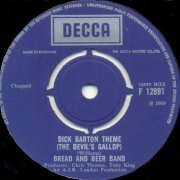 |
7" (1969) ***/½ Dick Barton Theme (the Devil's Gallop) Breakdown Blues |
Current availability:
Mellotron used:
It seems that the Bread & Beer Band were something of a pickup outfit, members including Hollies bassist Bernie Calvert, session guitarist Caleb Quaye and little-known pianist Reg(inald) Dwight. They recorded a single in 1969, Dick Barton Theme (The Devil's Gallop) b/w Breakdown Blues, followed with a version of Donovan's Mellow Yellow in 1970, taken from an unreleased album. Said album's available on the bootleg circuit, a set of largely instrumental session-guy covers, only really of interest to period obsessives, I suspect.
Their debut's a decent enough version of the Dick Barton Theme, which you know, even if you think you don't, Reg/Elton playing Mellotron, with occasional squawking brass interjections, probably from a studio MkII. Want to hear this for a few seconds of Mellotron brass? It's on YouTube.
See: Elton John
 |
Utopia (2019, 44.30) ***½/T |
|
| Åben Bog Højder Bjerget Tusmørke Saime Vega Solopgang Vågner |
Op Salig Dråber Determination |
|
 |
download (2019) ***½/T½ Dråber Intelude Dråber (Pt. 2) |
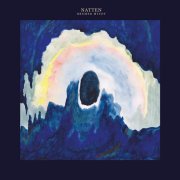 |
Natten (2021, 39.40) ***/T½ |
|
| Natten Mit Hjerte Gratitude Hjertebarn Nu og Altid April Aurora Nova |
Måneskin Natten (part 2) Lalibela |
|
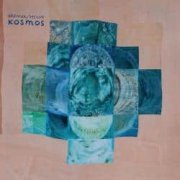 |
Kosmos (2024, 35.28) ***/T |
|
| Higher Road Dream Mere Liv Hvor Du Er Alting Løser Sig Bøn Blomster Du Sår Regnen Falder Snart |
Vuggevise Universal Love |
|
Current availability:
 |
|
| Bremer and McCoy staggering in, carrying an M400 | |
Mellotrons used:
Jonathan Bremer and Morten McCoy are, respectively, a bassist and pianist, active on the Danish jazz scene, 2019's Utopia being their fourth album together, albeit their first international release. Discogs may well describe it as 'smooth jazz', but this has as much in common with the hideous likes of Kenny G et al. as, I dunno, something very good has with something very bad. It isn't really 'jazz' at all, for most of its length, more beautiful, semi-ambient piano/upright bass instrumentals, possibly at its best on Tusmørke and Dråber. McCoy (presumably) plays the (hired? Borrowed?) Mellotron on Dråber, with a gorgeous flutes-backed-by-strings part, although the strings on Saime (although Tusmørke is credited) and cello on Solopgang are real, while that's a synth on closer Determination. I'm intrigued to hear what this duo do next. Recommended. Incidentally, Dråber was released as a three-track single, also featuring the brief Dråber (Pt. 2), with more of those strings.
2021's Natten (Night) carries on in a similar vein to its predecessor, at its possible best on the beautiful opening title track, Hjertebarn and Nova, the last-named chiefly due to a radical pitchbend in the entire mix around the four-minute mark. To be honest, however, unless you're heavily into this stuff, it all starts sounding a little samey after a while. The law of diminishing returns? Probably McCoy on Mellotron again, with strings through a delay line on both parts of the title track and a flute line (also delayed) on Hjertebarn. 2024's Kosmos is, well, more of the same, which won't be a problem if you love what they do, probably at its best on opener Higher Road, Mere Liv and Bøn. A couple of things sound like they could be a Mellotron (notably the flutes on Dream), but don't quite have that 'ring' about them, but the flutes on Bøn sound genuine, although it seems that's our lot. Incidentally, given that their Facebook page has pics of them using a real, actual Mellotron live, it seems fairly likely that they own their own machine, presumably an M400.
See: Livity Allstars
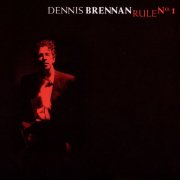 |
Rule No. 1 (2000, 40.25) ***/½ |
|
| I Got My Own Going Down Gracefully Keep Me Standing Government Johnny McKee Trouble Barbara Allen's Dream This Kind of Love Crying on the Avenue |
Book of Love Where Did We Go Wrong? Dream in Six |
|
Current availability:
Chamberlin used:
Boston's Dennis Brennan has been active since the '70s, 2000's Rule No. 1 being his third solo release. Best described as solid roots rock, highlights include opener I Got My Own, the country of Government Johnny McKee and Trouble, amongst others. Brennan's care-worn voice suits his material perfectly, or should that be the other way round?
Paul Bryan plays his own Chamberlin on Going Down Gracefully, with a brief, high string line that I would've passed as genuine even without a familiar name to give it authenticity, although I'm less convinced by the strings on Trouble.
See: Samples etc. | Paul Bryan
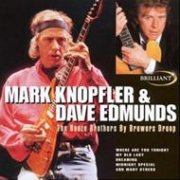 |
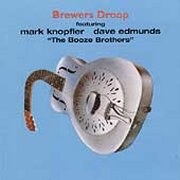 |
The Booze Brothers (1989, recorded 1973, 36.47) **/T |
|
| Where Are You Tonight Roller Coaster You Make Me Feel So Good My Old Lady Sugar Baby Rock Steady Woman Louise What's the Time |
Midnight Special Dreaming |
||
Current availability:
Mellotron used:
Brewers Droop were a good-time early '70s Cajun pub-rock band (!) from High Wycombe, near London, with no notable members, although several of them have a good name on the blues scene, apparently. So why the large picture of Mark Knopfler on the sleeve in his mid-'80s pomp (and terrible blouse)? Seems he played guitar on three tracks, before he developed his signature style. The legendary Dave Edmunds produced a few tracks, too (thus his smaller pic), while future Dire Straits (and ex-Spring) drummer David "Pick" Withers also contributed. It seems the band released one album, 1972's Opening Time, then recorded what eventually became The Booze Brothers, with Knopfler, Edmunds and Withers; fast forward sixteen years, an unscrupulous record company sticks that big pic of Knopfler on the front and hey presto, er, a dullsville pub-rock album with no distinguishing features.
Harmonica whizz Steve Darrington doubled on keyboards, mostly piano(s) and blues Hammond, but on Roller Coaster he sat down at the doubtless studio Mellotron and put down some flutes and strings, although I can't really say they add that much to the album. Unless you're a real nut on this kind of stuff, I have to say: avoid. They only reason I got through it was by judicious use of the 'skip' button, but then, I prefer my blues a bit leaner and meaner than this, to be honest. Dull, although at least the alternate sleeve has a modicum of wit about it. Incidentally, I'm sure there's no connection, given his limited involvement, but I wonder if Knopfler was giving this lot a nod when he wrote the line, "You've got smoker's cough from smoking, brewer's droop from drinking beer" on Love Over Gold's Industrial Disease? Probably not.